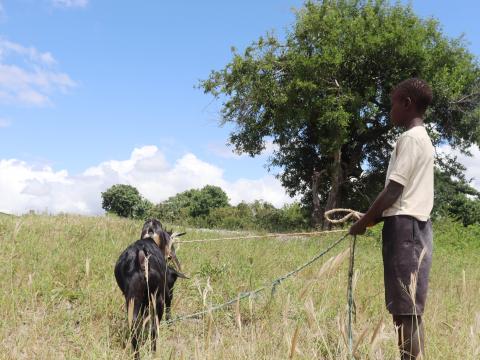Toiling Futures Away: The impact of child labour on children's education in Malawi

Twaibu is 15 years old, and only in Grade Three. He should be well ahead in school, probably in Grade Eight by now. But he has been toiling the years away, herding goats for his family from sunrise to sundown, therefore hindering him from attending school as he would have desired.
“I would only eat in the evenings after I came back from the field", he narrates. "Because I did not have shoes, I used to go barefoot. I have stepped on thorns so many times I can’t even count; my feet would get swollen but still I had to go out to herd the goats because my family relied on me to do it. In the event that we completely did not have food at home, we would eat wild fruits called nthudza.”
Twaibu is among a group of young boys that have recently returned to school, all thanks to the advocacy and child protection work that World Vision is partnering with communities to accomplish. For some of these children, the luckier ones, their parents would let them go to school in the morning hours, before they were required proceeding to herd goats after classes. For others, however, school was entirely out of the question.
“Sometimes the goats would be sold, and the money realised therein used to buy school materials and food at home. That’s why it was important that we herd the goats diligently”, explains 13-year-old Precious.
These young boys have had their childhood taken away for so long, but we hope, that this marks a turn-around for them: to be young, carefree and educated.
“I enjoy coming to school now, because I get to interact with my friends, and the subjects we learn are really interesting. I love mathematics and English, and hopefully one day I can be a teacher”, says Twaibu.
Child Sponsorship Team Leader Joseph Chikwapula explains, “It is to be noted, that not all work is classified as child labour, as it all depends on the type of work, and the hours worked. However, we noticed that communities here are unaware of child rights, as they think it is all part of chores that children are to participate in.”
According to the International Labor Organisation (ILO), “child labour is often defined as work that deprives children of their childhood, their potential and their dignity, and that is harmful to physical and mental development.” Joseph's team has engaged community volunteers, who in turn have engaged parents to realise the importance of school and the dangers of having children work for too long in bad weather and without food.
Bundled up, these boys, ranging from nine to 15 years old, have stories similar to Twaibu's to tell. Stories of walking for long hours and longer distances; of taking baths in water streams and rivers; of having just one meal per day, and sometimes barely eating; of missing school and missing out on play time as children.
Child labour takes away from the children their rights to play, to education and to a safe space. Poverty and lack of civic education rank top among the reasons why child labour is rampant in Chitundu, Dedza. For this reason, World Vision used the Citizen Voice and Action model to sensitise communities against child abuse.
-
By Wezi Nungu - Zonal Communications Officer, World Vision, Malawi